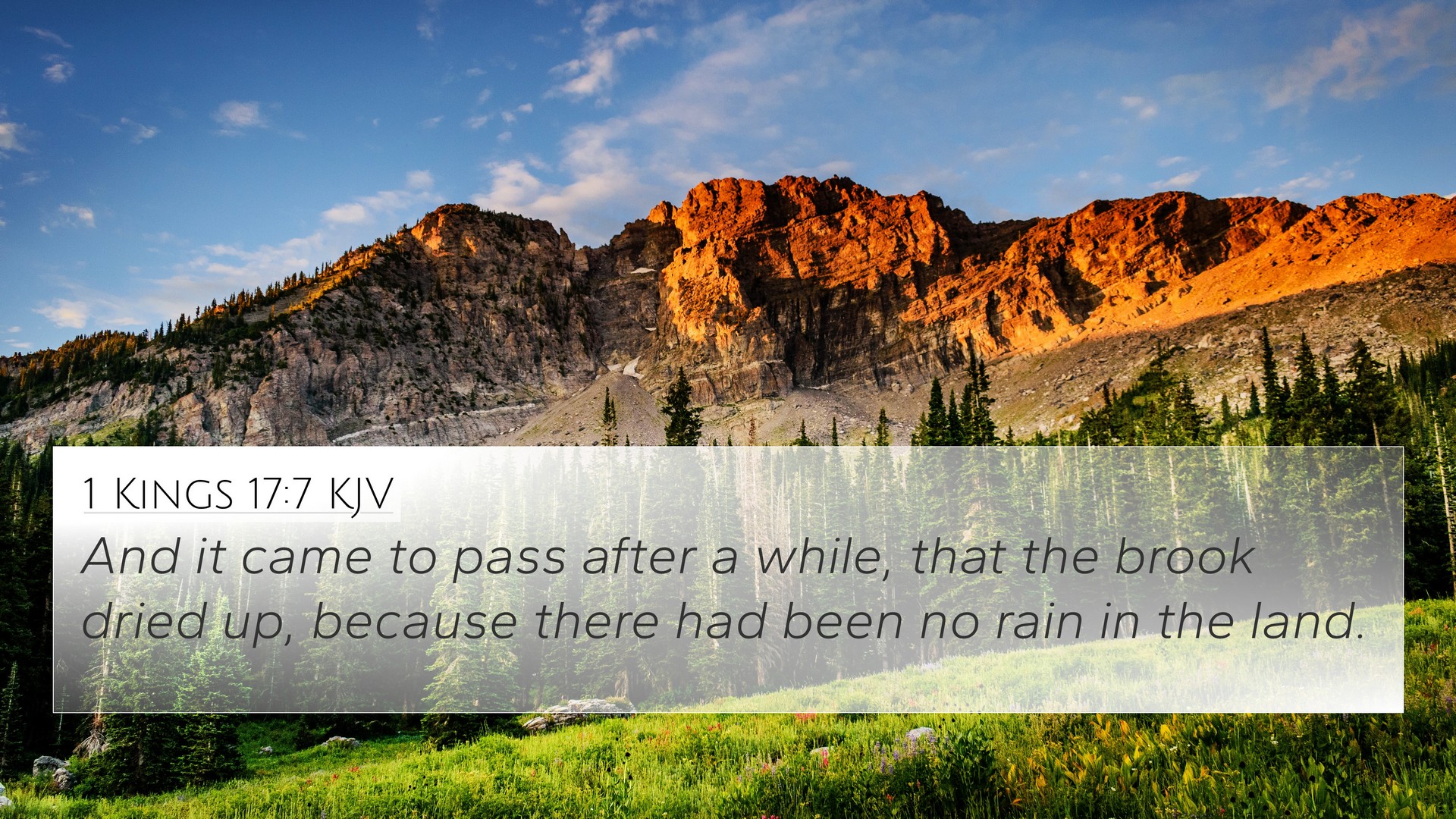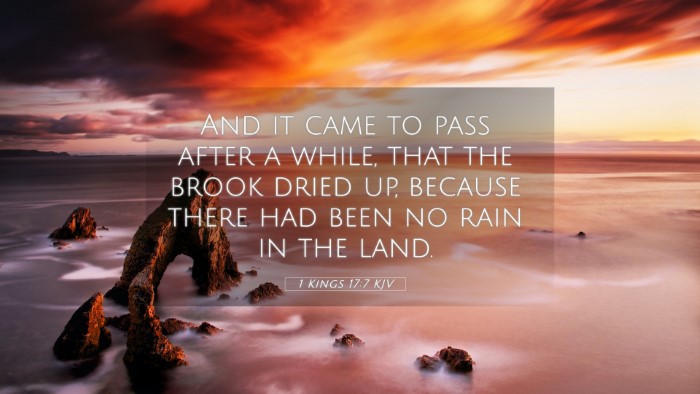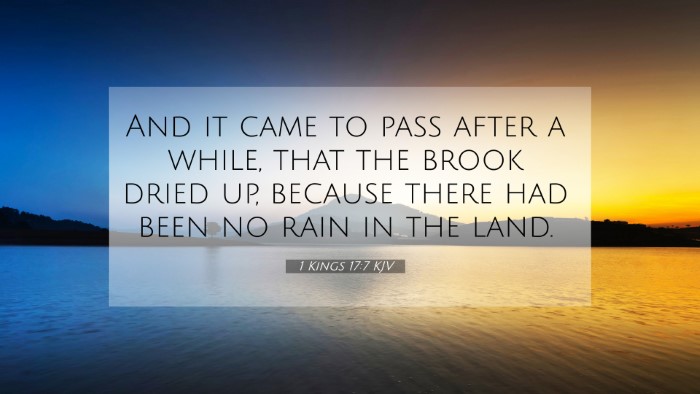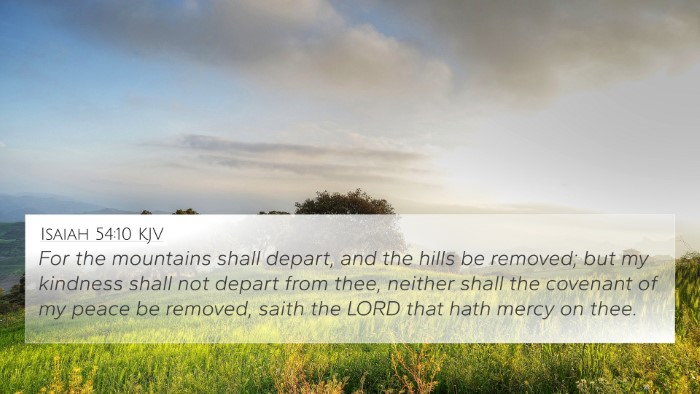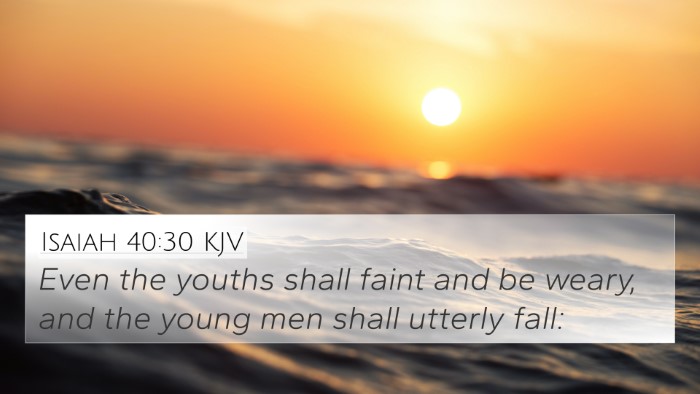Understanding 1 Kings 17:7
Bible Verse: 1 Kings 17:7 - "And it came to pass after a while, that the brook dried up, because there had been no rain in the land."
Summary and Meaning
The verse speaks about a crucial point in the life of the prophet Elijah as he experiences a period of testing and divine provision.
Context of the Verse
The context in which 1 Kings 17:7 is set is significant. Elijah had been sent by God to the brook Cherith to be nourished during a time of drought as he delivered God’s message of judgment to Israel. The drying up of the brook signifies a transition and a challenge in his prophetic mission.
Insights from Public Domain Commentaries
- Matthew Henry: Henry underscores the dependency of both Elijah and the people on God's provision. The drying of the brook illustrates that earthly supplies can fail, prompting reliance on divine providence.
- Albert Barnes: Barnes notes that the phrase "after a while" suggests that the provision was not indefinite. The cessation of water was a test for Elijah that would ultimately lead to further revelations of God’s power and sustenance.
- Adam Clarke: Clarke emphasizes the symbolic nature of the brook drying up as a representation of spiritual desolation that confronted the people of Israel. The drought indicated not merely a physical need but a larger spiritual crisis.
Cross-References to 1 Kings 17:7
To deepen the understanding of 1 Kings 17:7, several Bible verses connect with its themes of divine provision, human reliance on God, and transitions through trials:
- James 5:17-18: Elijah's fervent prayers during the drought and the divine response reflect the theme of God's active involvement in human affairs.
- Psalm 37:25: This verse underlines the theme of God’s provision, assuring believers that He will not abandon the righteous.
- Isaiah 43:19: God speaks of making a way in the wilderness, connecting to how He provides new paths and sustenance in dire circumstances.
- Philippians 4:19: This New Testament reassurance of God’s provision mirrors the Old Testament promise of care for His servants.
- Exodus 16:4: The Israelites receiving manna in the wilderness complements the narrative of reliance on God's miraculous provisions.
- 2 Corinthians 1:8-9: Paul discusses the trials faced and their purpose, resonating with Elijah's experience of hardship and divine rescue.
- Matthew 6:26: Jesus reminds followers of God’s care for all creatures, highlighting the broader principle of divine provision.
Thematic Connections and Interpretations
The verse presents a rich ground for thematic Bible verse connections:
- This verse serves as a testament to the principle of divine sustenance in times of need.
- It highlights the recurring biblical motif of God providing for His prophets and people despite adversity.
- The transition from abundance (the brook) to need (its drying up) marks a pivotal moment in faith journeys, inviting deeper trust in divine timing.
Tools for Bible Cross-Referencing
For those studying 1 Kings 17:7 and seeking to explore its connections further, consider using:
- Bible Concordance: A tool for finding related verses according to keywords.
- Bible Cross-Reference Guide: Helps identify thematic links between different scriptures.
- Cross-Reference Bible Study: Methodologies to analyze how Bible verses relate to each other.
Conclusion
1 Kings 17:7 not only recounts an event in Elijah's life but also serves as a profound reminder of the interaction between God’s providence and human experience. The drying up of the brook is a call to faith, urging believers to recognize and trust in God’s provision amidst challenges.
